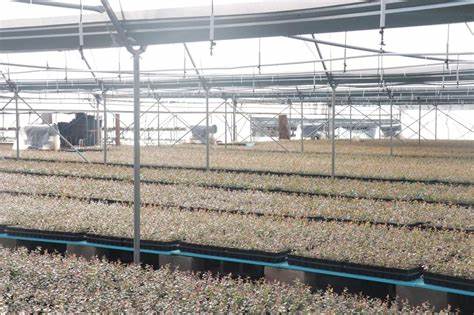It’s still a little chilly outside at this time of year, but in the blueberry seedling greenhouses of
Martin Dabilly, spring is everywhere.
Dabilly is a French agricultural engineer who came to southwest China’s Yunnan province 16
years ago. He once planted raspberries in the province and now runs a berry plantation in
Longyuan village, Songyang township, Songming county of Kunming, capital of Yunnan.
On a business trip to China in 2006, Dabilly found raspberry, a fruit that was very common in
Europe, was rarely sold in China. Therefore, he planned to bring the fruit to the Chinese market.
“The great climate and ecology in Yunnan attracted me,” he said, explaining the growing
condition of raspberries is very demanding. The fruit needs sufficient sunlight, comfortable
temperature and clean air, and that’s why the man chose Songming county. What’s more important
is that the local government attaches high importance on sustainable development, which
conforms to his development philosophy.
Huang Jianwei, deputy director of the Songyang neighborhood committee, Songming county, told
People’s Daily that the local government, with the aim to promote the philosophy of green
development, has provided multifaceted policy and capital support for farmers to help them renew
production mode.
Today, more and more greenhouses in the neighborhood have started using degradable films and
organic fertilizers. Besides, the local government has constantly advanced water environment
treatment, covering the banks of rivers with paddy fields as a natural way to improve water
quality. It is also launching regular monitoring on soil and irrigation water to ensure safety.
“Our blueberry seedlings are mainly aimed at the winter market,” Dabilly told People’s Daily as
he checked the growth of the seedlings in a blueberry seedling workshop. “We have potential
customers in these places,” he said, pointing to several contiguous green dots on a Yunnan map.
According to data released by Yunnan’s provincial department of agriculture and rural affairs,
Yunnan province has become a core producer of berry fruits in China. The province planted
101,200 mu (6,747 hectares) of blueberries in 2020, or 9.5 percent of the country’s total. The
output stood at 35,000 tonnes, accounting for 17.5 percent of the total production of China.
Dabilly’s company has been recording increasingly better performance since it was established.
Last year, he applied patents for six blueberry varieties he nurtured, which gained him a number of
partners. Now, the partners’ total planting area of blueberries has exceeded 6,000 mu.
“I see this as not only a job, but also a pursuit of mine,” the man said.
Now Dabilly’s plantation hires more than 30 local villagers, who were vegetable farmers before
working for the French man. To help them gain berry planting skills as quickly as possible,
Dabilly always gathered them for instruction. Soon the villagers could identify the maturity of
fruits, as well as pick and pack the fruits quickly. “They are now semi-experts in berry picking,”
Dabilly said.
Longyuan village, while developing crop farming, has also attempted to build featured industries
in the past decades. It has enhanced its support for enterprises and products that have potential, so
as to drive local economic development.
The sound industrial development has led to better livelihood. “Many families in the village used
to live in houses built with mud and dirt, and villagers always came to the office by foot. But now
most of them have built new houses and bought cars. I’m glad to have witnessed all these
changes,” Dabilly said.
The French man is a biking enthusiast. Every week he would go biking in the forests surrounding
Longyuan village together with his friends. He loves the mountains, trees, greenness and vitality
there. “Here is where I enjoy my ideal lifestyle,” he told People’s Daily.



